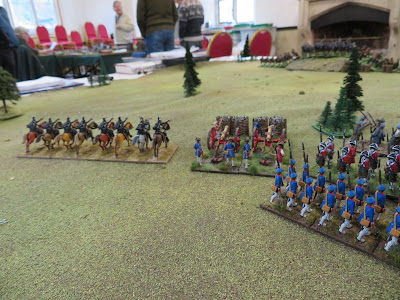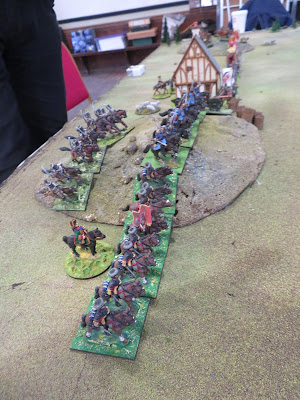Wherein the army of the Margravate of Badwurst-Wurstburp under General Bazyli Antonin Unpronunski encounters the forces of the the Duchy of Kurland, commanded by Grand Duchess Catherine.
Monday is rarely anyone's favourite day. For many in the civilised world, it is the first day of the working week; and so signals that point of the greatest distance from a lovely Sunday lie-in. For those in Mittelheim, it often signals the end of one working week and the immediate start of the next. Thus, it unhappily combines the discontent experienced by those who do not have a day off, with the feelings simultaneously of mutiny at the prospect of having to do it all again. In the Margravate of Badwurst-Wurstburp, however, there is yet another reason to feel that this day is a rather a sub-optimal one: a suprise attack by their neighbours to the north, the Duchy of Kurland. Mobilising the army, the Wurstburp commander, General Bazyli Atonin Unpronunski has been ordered to sweep the invaders back across the border. Or, if a broom doesn't work, to actually fight them.
Heretically for many within her own country, the Grand Duchess had taken up the burden of commanding her military forces. (Below) At her headquarters, Grigori Savvinos, a recently arrived notable, has been established as the army's chief of staff. Savvinos' qualifications put him well ahead for this role of any native Kurlandian: he can read and write, and he does what he is told.
The Kurlandians have advanced cautiously, and have occupied the area in the vicinity of the Wurstburp village of Merkenwig. It stands amid open terrain, marked by a low hill or two, and small woods: so, much like the forest terrain that has featured in other recent battles. As a student of military history, Catherine has realised that nothing says that one means serious military business like deploying an army in a big, long line. And so, to rueful shaking of heads from her Kurlandian subordinates, she orders her troops deployed into a big, long line (below).
Catherine has deployed her army between the two hills that stand either side of Merkenwig village (above). The Kurlandian irregular cavalry, three sotnias of Cassock horsemen, hold the left flank (below). Of course, being Cassocks, they don't really 'hold' the hill, so much as mill around on it looking lost. If the hill were smaller, and more mobile, they would try and steal it; if it were more attractive, and more mobile, they would try and carry it off and ravish it. But as it is, since the mound doesn't fall into either of the two categories, the irregulars hang around, non-plussed.

In the centre, the infantry are deployed. One regiment holds the village; two are held in reserve; the remainder form a firing line between the village and the Cassocks. The reserve infantry are the army's conscript troops. Catherine hopes that their role will be more in an observatory capacity, since if they actually have to fight it will be a sign that things aren't going altogether to plan.

To the right of the village, the Duchess has decided to mass all three batteries of her artillery. This is a decision that some sceptics might argue is already an exercise in reinforcing failure. Having one battery of artillery is bad enough: but placing three in close proximity only increases the chances of some embarrassing failure on the part of technically-minded social inferiors.
Finally, holding the right, Boris Katsonov commands the Kurland regular cavalry. He himself is attached to the Berndt-Lippe Carabiniers. Catherine's army watches at the Wurstburpers form up on the other side of the field. Notwithstanding the poor record thus far of their Wurstburp adversaries, many of the Kurlandian officers are sceptical about their chances in the coming encounter. Real wars are fought by men; badly, it is true - but can one really have full confidence in a commander who is largely immune to being kicked between the legs?














